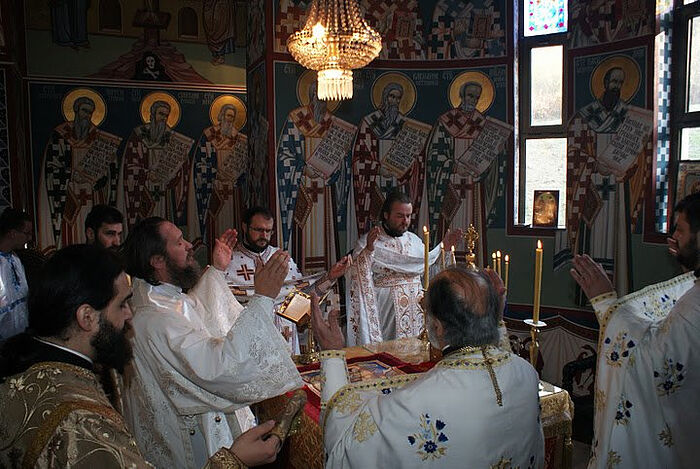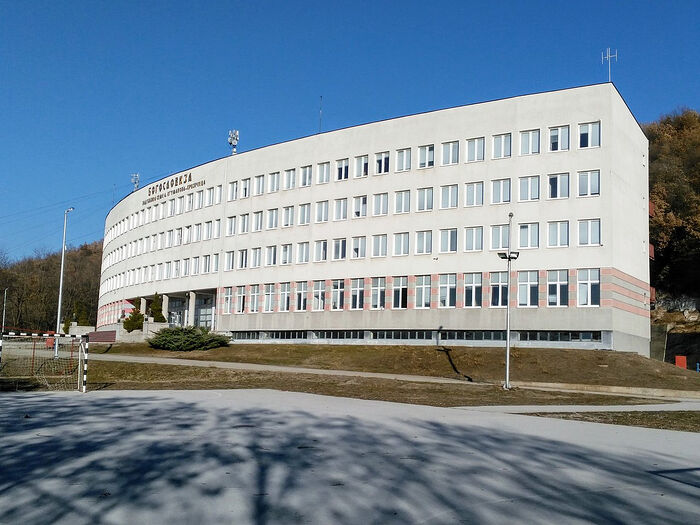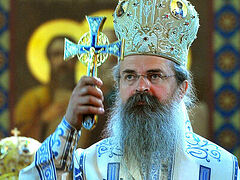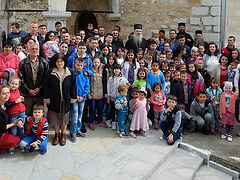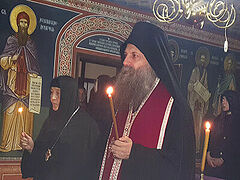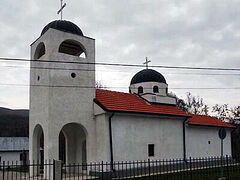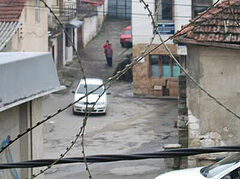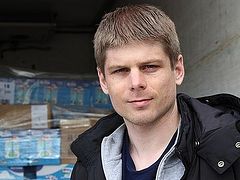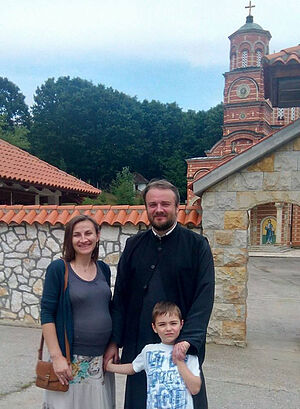 Archpriest Dejan Krstic with his wife Fr. Dejan Krstic was born and raised in Kosovo, but was forced to leave that long-suffering region after the “recognition of independence” of the territory and the sad events that followed. He decided to become a priest quite unexpectedly, but he is sincerely happy with his choice and grateful to God for this path.
Archpriest Dejan Krstic with his wife Fr. Dejan Krstic was born and raised in Kosovo, but was forced to leave that long-suffering region after the “recognition of independence” of the territory and the sad events that followed. He decided to become a priest quite unexpectedly, but he is sincerely happy with his choice and grateful to God for this path.
We talked with Fr. Dejan of the Nis Diocese of the Serbian Orthodox Church, priest of the Church of the Resurrection of Christ at the dependency (metochion) of Hilandar Monastery in Nis and a part-time teacher of Church Slavonic at the Prizren Theological Seminary of Sts. Cyril and Methodius, about the difficult lot of the Prizren Seminary, the Kosovo issue, spiritual authorities, preaching on the internet, the link between the economy and the atmosphere in society and the spiritual state of a people, service as the most important principle of a priest’s life, and love as motivation for a pastor.
—Christ is Risen!
—In Truth He is Risen!
—Fr. Dejan, how did you convert to the faith? What influenced your decision to become a priest?
—I was born and raised in a typical Socialist Yugoslav family. There were no priests or monks in our family. Although my sister and I were baptized forty days after we were born, and we would celebrate the “Krsna Slava” [the celebration of the family Patron Saint’s Day, which every family chooses for itself.—Trans.] with loved ones, no one practiced the faith in our home, except in relation to things that have to do with customs or folklore. However, thank God, the entire city of Prizren, where I grew up, was “saturated” with traditions of Holy Orthodoxy: in folk customs, traditional home education, and urban architecture. So, at an age when young people begin to ask themselves questions about the meaning and purpose of life, the faith and traditions of the Orthodox Church became a real treasure for me after I had discovered them. At this tender age young people usually “wander” through life in a spiritual search, but it seems to me that during that period the hand of God guided me to the person I have become today. And I am grateful to God for this.
Although there was a seminary in Prizren, it had never crossed my mind to go there. Once, during an evening service in our Cathedral of St. George the Victorious, a priest who was censing the church and walking by me suddenly asked me which grade I was in. I replied that I was finishing the eighth grade. Then he said to me: “Why don’t you go to seminary?” and went on censing without waiting for my answer. I thought hard and then entered the seminary, which from that moment became the main and only “school” in my life!
—So the words of a priest spoken as if in passing so touched your heart that you made a crucial decision in your life?
—Yes, absolutely right!
—Incredible! Fr. Dejan, you were born in Prizren, in Kosovo. Today, the spiritual cradle of the Serbian people has become the place of their national pain. Sad stories about what happened after the proclamation of independence of these lands and the de facto seizure of Kosovo by Albanian separatists, alas, are enough and to spare. It is clear that this painful wound didn’t appear overnight. Why did this scenario become possible in the first place? Was it the weakness of the State, a blunder of politicians, or a spiritual punishment for the Serbian nation?
—The sacred space of Kosovo and Metohija, the cradle of the Serbian nation, is paradoxically both the foundation and the crown of our national and spiritual identity. Kosovo is both the cradle and the grave of the Serbian people. The grave where, like a wheat grain, our enemies have buried us for centuries, and again and again with the help of God we have risen from this grave, bearing abundant fruit. Therefore, the Kosovo problem is a painful issue for every Serb. Holy Prince Lazar had to choose between the earthly kingdom and the Heavenly one. And he made his choice in favor of the latter.
The reality in which we live today in Kosovo and Metohija can undoubtedly be called, “Divine education”.
I am positive that nothing happens without the will of God, or at least without His permission. For educational purposes God temporarily takes churches and shrines from those who are no longer worthy of them, waiting for their repentance and reform. O God, the heathen are come into Thine inheritance; Thy holy temple have they defiled (Ps. 78:1), and what we read further in Psalm 78—that’s what happened. The Serbian people have sinned nuch against the Church of God and their holy ancestors. In Communist Yugoslavia, we distanced ourselves from God more than we did throughout the entire period of the Ottoman yoke. This affected the whole nation’s spiritual life dramatically. For decades the atheist Government didn’t attach any importance to the Church’s reports of the siezure of the Church property and the quiet yet constant terror and harsh pressure on the Serbian people in Kosovo and Metohija. The Serbs were increasingly losing hope of survival in this region and they gradually abandoned it. Now we are aware that this whole scenario was orchestrated...
—Did you leave Kosovo long ago? Have you often visited Prizren since you moved?
—I left Prizren on June 16, 1999, when after the Kumanovo Agreement was signed, international peacekeeping forces began to arrive in the city. It immediately became clear that they had neither the power nor the will to provide us with a peaceful life. For their own safety Serbian people left Kosovo; and I, together with Artemije (Radosavljevic), the then Bishop of Raska and Prizren, went to Gracanica Monastery in the central part of Kosovo, where I stayed until October 2000. I am always happy to come back to Prizren when I can, but, unfortunately, this doesn’t often happen.
—Who of the contemporary leaders of the Serbian Orthodox Church has had the greatest influence on you? Can you name some figures as examples you try to follow?
—For though ye have ten thousand instructers in Christ, yet have ye not many fathers (1 Cor. 4:15)—I would answer that way. I consider myself happy because I happened to live in the times of great fathers of the Orthodox Church, such as Patriarch Pavle, Metropolitan Amfilohije (Radovic), Bishop Atanasije (Jevtic), Archimandrite Jovan (Radosavljevic) ... Each of them, individually and collectively, influenced me by their deeds, and they continue to influence the Orthodox, pastoral, ascetic formation of my way of thinking.
The first of them, Patriarch Pavle, was Bishop of Prizren for more than three decades. His modest appearance, prayerfulness, quiet speech, simple and always neat clothes made a great impression on all of us. He spoke even about the most ordinary, everyday things through the prism of the Gospel. Every conversation with him was a lesson.
His services, especially during Holy Week, were so wonderful that they can only be compared to those in the Holy Land. During those services my desire to be a priest only strengthened.
Later, through theological education, I became acquainted with the literary work of two leading theologians of our country: Metropolitan Amfilohije and Bishop Atanasije. I was blessed to live at Gracanitsa Monastery for over a year and get to know Bishop Atanasije (who had come there from Herzegovina) more closely. Now, after his death, I can freely say that he was a veritable volcano of divine love, compassion and theological wisdom.
—You have been teaching at the Prizren Seminary for several years now. Can you tell us a little about its life, its significance for the diocese, and the problems the seminary regularly faces? What’s the reason for the decline in the number of new seminarians?
—The Prizren Theological Seminary of Sts. Cyril and Methodius was moved to Niš due to historical circumstances and the will of the powers that be, after the bombardment of our homeland in 1999, when most Serbian people literally had to flee the region for safety. Bishop Irinej of Nis, who later became the Patriarch of Serbia (a former student, professor and rector of the theological seminary in Prizren), took the seminary under his fatherly care and tried his best to make its life easier in those difficult days. The seminary was located in the Hilandar Monastery’s dependency in Nis, in a room that wasn’t suitable for studies at all. In 2001, the foundation was laid for a new building, which was constructed with funds of the Sima Igumanov Foundation (named after a famous Serbian philanthropist) and commissioned in 2005. The seminary in Nis is one of the largest in the Serbian Church, with very good conditions for its students, teachers, and everyone else. Unfortunately, in recent years we have had fewer students, which is due to the fact that our bishops limit the number of students, because there are fewer vacancies for priests and teachers of religion and because of the decline in the number of young people choosing the “narrow path” of confessing the gospel of Christ. The Seminary is a boarding school with its own specifics, because future priests are trained within its walls. In order for someone to be a priest, he must have great courage, and be willing to put the needs of others above his own.
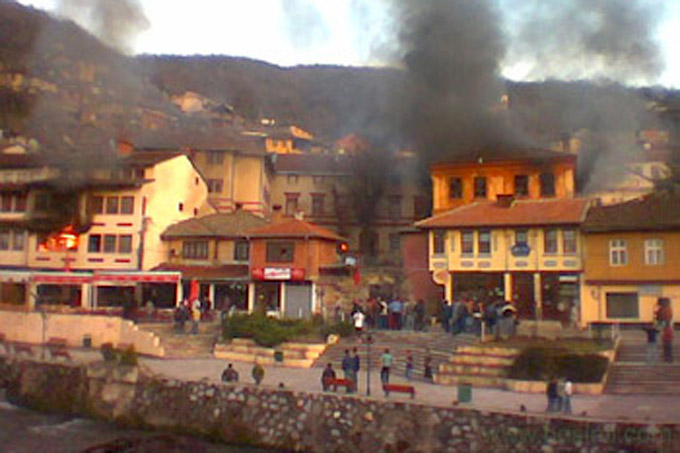 The fire at the seminary in Prizren
The fire at the seminary in Prizren
Thank God, the theological seminary in Prizren resumed its work in 2011. As we often emphasize, the enemies of our people wanted the Prizren Seminary to disappear. That’s why it was set on fire during the pogrom in March 2004. But God wanted us to have two seminaries with the same name today: one in Prizren and the other in Nis.
Our seminary in Nis has preserved the name, traditions and identity of the famous Prizren Seminary. Throughout those war and post-war years not a single life was lost—neither teachers, nor students, nor auxiliary personnel, nor a single academic year was lost. The school library and archives have been preserved as well.
On the other hand, Niš is the largest city in southern Serbia and a university center with many high-level educational institutions, and as such it provides a number of opportunities for the education of young people. The Diocese of Nis is one of the oldest in our Church, and it deserves to have a theological school on its territory. Our professors and students are actively involved in diocesan life. We have excellent support from Bishop Arsenije (Glavcic) of Nis, who understands the important role of the educational institution not only for the diocese but also for the whole of the Serbian Church, since seminarians from other dioceses study here as well.
—You teach Church Slavonic. Is it true that this language is gradually disappearing from the liturgical life of the Serbian Church—at least in parishes—and being replaced with the Serbian language that people understand? In your opinion, what is the value of Church Slavonic?
—Church Slavonic is the classical language of our antiquity, with which we entered the historical arena. The first words written in the Slavonic alphabet were the words about God the Word from the Gospel of John. This speaks volumes, and at the same time determines the course of our history.
In addition, Church Slavonic is the language in which we communicate with God, but also with our Slavic brothers. Thanks to the knowledge of Church Slavonic every Serbian priest can easily concelebrate with Russians, Ukrainians, Bulgarians, Czechs, Slovaks... It is hard to convey the depth of this ancient and sacred language because Church Slavonic also acts as a unifying factor of the Orthodox Slavs, and even more broadly, all the Christian Slavs.
In parish churches of the Serbian Church, the Serbian language is gradually beginning to dominate in the services for obvious reasons. For those same reasons, the Moravian Prince Rastislav asked the Byzantine Emperor to send him learned men who would preach to Slavs in a language they understood. But we are trying to preserve Church Slavonic through our secondary and higher theological education, because in effect seminaries and theological departments are the only places where this language is studied here.

